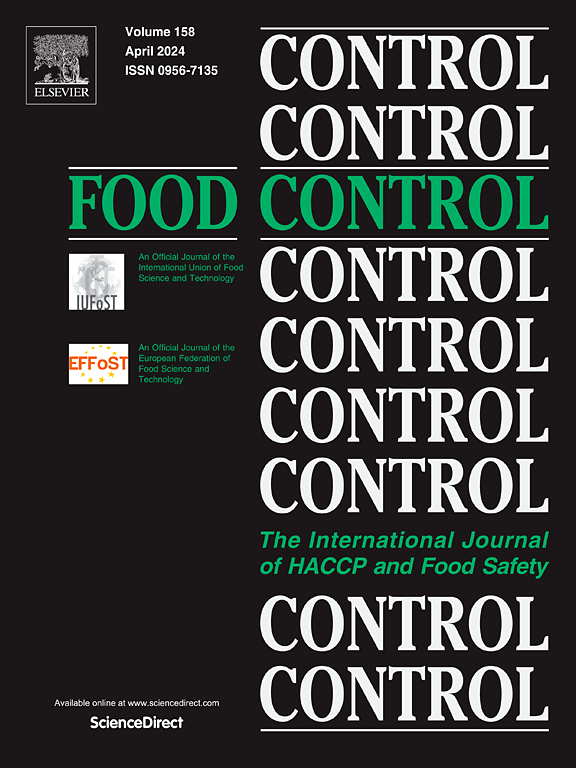Thermal inactivation of non-proteolytic Clostridium botulinum spores in chilled plant-based foods
IF 5.6
1区 农林科学
Q1 FOOD SCIENCE & TECHNOLOGY
引用次数: 0
Abstract
To support innovation in the dynamic plant-based foods sector, a study was conducted to set fit for purpose and risk-based alternative thermal processing conditions to the usually used safe harbour heat treatment of 90 °C - 10 min that ensures food safety of extended shelf life refrigerated products. To do so, inactivation data were collected to determine the thermal resistance properties (D- and z-values) of non-proteolytic Clostridium botulinum Type E spores (reference strain NCTC 8266) then build and validate specific inactivation models for two plant-based products: Konjac-based Seafood Analogue (Product 1) and Canola-based Eggs Analogue (Product 2) with desired sensorial properties not compatible with the application of the classical heat treatment of 90 °C - 10 min.
D-values were determined at five temperatures ranging from 78 °C to 86 °C for each matrix to build the model and additional data were collected at 75 °C and 80 °C to validate the model. Dref80°C-values were estimated at 1.90 and 0.80 min and z-values at 6.12 °C and 6.84 °C respectively for products 1 and 2. Simulations were performed to estimate the time required to reach the required Performance Objective (PO) of 6 log reductions to ensure food safety at different temperatures for each product. The targeted PO could be reached in both products with lower temperatures and shorter times compared to the safe harbor. Results showed that the inactivation of non-proteolytic C. botulinum Type E spores was faster in product 2 compared to product 1. The developed and validated models, together with the proposed methodology can be used to support food industries in collecting specific data to justify setting fit for purpose heat treatments ensuring food safety with regards to the control of non-proteolytic C. botulinum type E spores without compromising on the desired sensorial properties such as those required for some plant-based products.
冷冻植物性食品中非蛋白水解肉毒杆菌孢子的热失活
为了支持动态植物性食品领域的创新,进行了一项研究,以确定适合目的和基于风险的替代热处理条件,以取代通常使用的90°C - 10分钟的安全港热处理,以确保延长货架期冷藏产品的食品安全。为此,收集失活数据,确定非蛋白水解型肉毒杆菌E型孢子(参考菌株NCTC 8266)的耐热性(D值和z值),然后建立并验证两种植物基产品的特异性失活模型:以魔芋为基础的海鲜模拟物(产品1)和以油菜为基础的鸡蛋模拟物(产品2)具有理想的感官特性,但与90°C - 10分钟的经典热处理应用不兼容。在78°C至86°C的五个温度范围内确定每个矩阵的d值以建立模型,并在75°C和80°C收集额外数据以验证模型。产品1和2的Dref80°C值分别为1.90和0.80 min, z值分别为6.12°C和6.84°C。通过模拟来估计达到要求的性能目标(PO)所需的时间,即减少6个对数,以确保每种产品在不同温度下的食品安全。与安全港相比,在两种产品中都可以以更低的温度和更短的时间达到目标PO。结果表明,与产品1相比,产品2对非蛋白水解型肉毒杆菌E型孢子的失活速度更快。开发和验证的模型,连同建议的方法,可用于支持食品行业收集特定数据,以证明设置适合目的的热处理,确保食品安全,控制非蛋白水解型肉毒杆菌E型孢子,同时不影响所需的感官特性,例如某些植物性产品所需的感官特性。
本文章由计算机程序翻译,如有差异,请以英文原文为准。
求助全文
约1分钟内获得全文
求助全文
来源期刊

Food Control
工程技术-食品科技
CiteScore
12.20
自引率
6.70%
发文量
758
审稿时长
33 days
期刊介绍:
Food Control is an international journal that provides essential information for those involved in food safety and process control.
Food Control covers the below areas that relate to food process control or to food safety of human foods:
• Microbial food safety and antimicrobial systems
• Mycotoxins
• Hazard analysis, HACCP and food safety objectives
• Risk assessment, including microbial and chemical hazards
• Quality assurance
• Good manufacturing practices
• Food process systems design and control
• Food Packaging technology and materials in contact with foods
• Rapid methods of analysis and detection, including sensor technology
• Codes of practice, legislation and international harmonization
• Consumer issues
• Education, training and research needs.
The scope of Food Control is comprehensive and includes original research papers, authoritative reviews, short communications, comment articles that report on new developments in food control, and position papers.
 求助内容:
求助内容: 应助结果提醒方式:
应助结果提醒方式:


